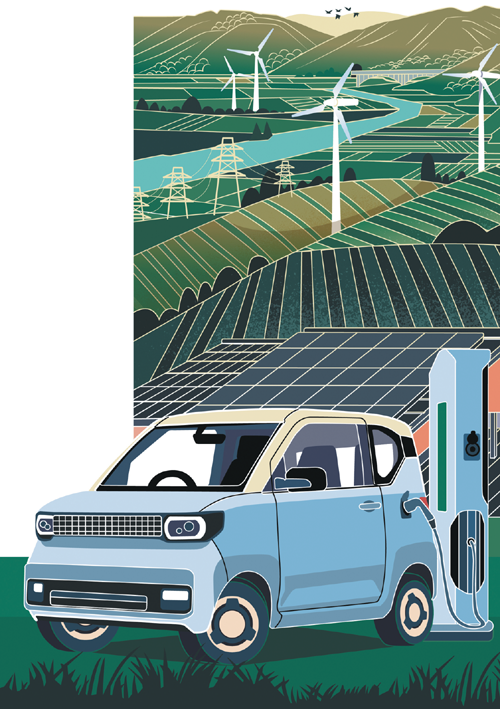Print
By Xu Wei | China Daily |
Updated:

SHI YU/CHINA DAILY
Measures call for promoting green vehicles, charging infrastructure
The latest policy measures to bolster the development of new energy vehicles and charging facilities in rural areas have boosted automakers' confidence, with officials and business leaders highlighting the immense potential of the rural market to shore up the growth of the sector.
The measures were adopted at an executive meeting of the State Council, China's Cabinet, and outlined in a policy document issued by the National Development and Reform Commission and the National Energy Administration.
Key steps include strengthening the development of public charging facilities and providing greater support to operators of the stations.
There were about 13 million NEV owners in China by the end of last year, more than half the global total. China has also developed the world's largest and most wide-ranging NEV charging network, with 5.2 million facilities already built, according to the NDRC.
Meng Wei, a spokesperson for the commission, told a news conference on May 17 that a lack of charging facilities remained the largest obstacle to the growth of the domestic NEV industry, especially in rural areas.
"So we sought to solve the problem through innovative measures to promote the building, operation and maintenance of charging infrastructure in rural areas," she said.
Official figures showed that in 2021, rural sales of NEVs were up 169 percent from 2020, and in 2022, sales increased 87 percent year-on-year.
However, Meng pointed out that the NEV market in rural areas is still nascent, with relatively few owners, a lack of charging networks and underdeveloped aftersales services constraining the growth of the sector.
Government support
According to the latest policy document, the central government will use special bonds issued by local authorities to expand the coverage of charging stations at service areas on highways.
It also set out goals to build more charging stations at government buildings, public institutions, commercial areas and transportation hubs, with steps to expand the network to tourist attractions and gas stations.
The government will encourage NEV manufacturers to further develop their service networks and support vocational schools in efforts to offer maintenance training for NEVs in rural areas, the document said.
Cui Dongshu, secretary-general of the China Passenger Car Association, said there is still immense potential to promote NEVs in the rural market.
"It is a huge market and represents a major opportunity for automakers. It will also reshape China's consumption structure and lead to more sustainable consumer spending," he said.
Cui highlighted the need to promote the development of home chargers for rural families, in addition to the development of public charging stations.
With the majority of vehicles in rural areas currently powered by fossil fuels, the shift to NEVs would significantly contribute to national green transition goals, he added.
To boost sales of NEVs in rural areas, the policy document pledged to encourage automakers to diversify the supply of their products, and develop cheaper utility vehicles.
Businesses will be offered incentives to promote secondhand NEVs in rural areas, and the government will urge authorities, schools and hospitals in counties and townships to use NEVs.
The use of NEVs for public transportation, law enforcement, sanitation and logistics will also be promoted, the document said.
The government will roll out multifaceted policies to entice rural consumers, including issuing coupons and offering incentives to rural residents to replace their scooters with NEVs, according to the document.
The government will also ensure that financial institutions offer proper loan rates and payment terms for purchasers of NEVs.
NEV makers hopeful
Jiang Weidong, a deputy to the National People's Congress and founder of the Wuzheng Group, which manufactures NEVs for commercial use in Shandong province, said the policy measures will be a major boost to the growth of the sector.
"The cost of using NEVs to transport goods is significantly lower than that of gasoline-powered cars, and I believe more users will switch to our vehicles in the future," he said.
As China advances its rural vitalization strategy, the potential of consumer spending in the rural market will be further unleashed, he added.
To tap into the rural market, Jiang said his company will take advantage of its online platforms to offer rural buyers greater support in terms of financing and after-sales services.
Farizon Auto, a manufacturer of electric vans, trucks and mini-trucks that is part of the Geely Holding Group, said the latest policy measures will help shore up the growth of commercial NEVs.
The company will develop more vehicles tailored to the needs of rural motorists, it added.
The policy has also boosted the confidence of operators of public charging stations, who are eager to tap into the potential for the rural market.
An Shuo, founder of the Beijing ShiJi Yunan New Energy Co, a company devoted to the development of public charging facilities, said that in order to fuel the expansion of charging stations in rural areas, operators must tackle difficulties in facility maintenance, and authorities should give greater priority to ensuring the safety of residents.
"The development of charging infrastructure must be planned in a forward-thinking manner to spur the growth of the NEV sector," he said.
An explained that many rural drivers park their vehicles in front of their homes, so the development of home chargers is also important.
Meanwhile, as the use of electric vehicles increases, there will be heightened demand for fast-charging facilities, which will increase pressure on power grids.
He expressed hope that the government will roll out more detailed policy incentives for the renovation of power grids, and offer businesses more support in the planning of facilities and operation procedures.
Copyright © Sanya Municipal Government. All rights reserved.
Presented by China Daily.